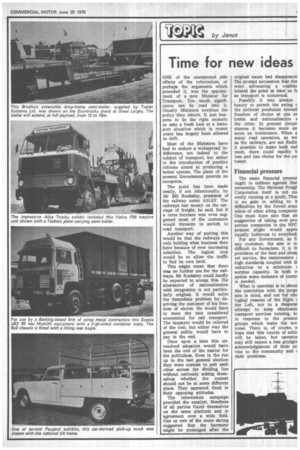Time for new ideas
Page 51

If you've noticed an error in this article please click here to report it so we can fix it.
ONE of the unexpected side effects of the referendum, or perhaps the arguments which preceded it, was the appointment of a new Minister for Transport. Too much significance can be read into it. Usually Ministers continue the policy they inherit. It just happens to be the right moment to take a fresh look at a transport sauation which in recent years has largely been allowed to drift.
Most of the Ministers have had to endure a widespread indifference, not indeed to the subject of transport, but rather to the introduction of positive reforms aimed at producing a better system. The plans of the present Government provide no exception.
The point has been made neatly, if not intentionally, by Mr Bill Ronksley, president of the railway union ASLEF. The railways lost money on the carriage of freight, he said, but if a rates increase was even suggested most of the customers would threaten to switch to road transport.
Another way of putting this would be that the railways are only holding what business they have because of ever increasing subsidies. The logical step would be to allow the traffic to find its own level.
This Might mean that there was no further use for the railways. Mr Ronksley could hardly be expected to accept this. His alternative of nationalisation with integration is not particularly original. It would solve the immediate problem by depriving the customer of his freedom of choice. He would have to meet the rate considered economical for rail transport. The taxpayer would be relieved of the cost, but either way the general public would have to pay in the end.
Once upon a time this unresolved situation would have been the end of the matter for the politicians. Even in the run up to the last general election they were content to pelt each other across the dividing line without seriously asking themselves whether the contest should not be at some different place. They appeared fixed in their opposing attitudes.
The referendum campaign provided the catalyst. Members of all parties found themselves on the same platform and in agreement over a wide field. One or twto of the more daring suggested that the harmony might be prolonged after the original cause had disappear& The prompt accusation that the were advocating •a coalitio missed the point at least so fa as transport is concerned.
Possibly it was always luxury to permit the swing c the political pendulum toward freedom of choice at one e3; treme and nationalisation a the other. In present circurr stances it becomes more an more an irrelevance. When s many road operators, as we as the railways, are not findin it possible to make both end meet, there could rapidly b less and less choice for the cw tomer.
Financial pressure
The same financial pressur ought to militate against Stat ownership. The National Freigl Corporation .itself is not cui rently running at a profit. Ther is no gain in adding to it difficulties by the forced acqu sition of other ailing companie One must hope also that an suggestion of taking over prof perous companies in the NFC present plight would appes equally ludicrous to everybod: For any Government, as ft any customer, the aim is nc difficult to formulate. It is th provision of the best and cheai est service, the maintenance c high standards coupled with th reduction to a minimum c surplus capacity. In both r( spects some measure of contrc is needed.
What is essential is to chaos the restriction with the prop€ aim in mind, and not for id& logical reasons of the Right c the Left, nor in a desperat attempt to keep obsolescea transport services running, tic in response to the pressux groups which make the mo5 noise. There is, of course, n hope that this course of actio will be taken, but operatoi may still expect a less grudgin acknowledgement of their se: vice to the community and c their problems.




























































































































































